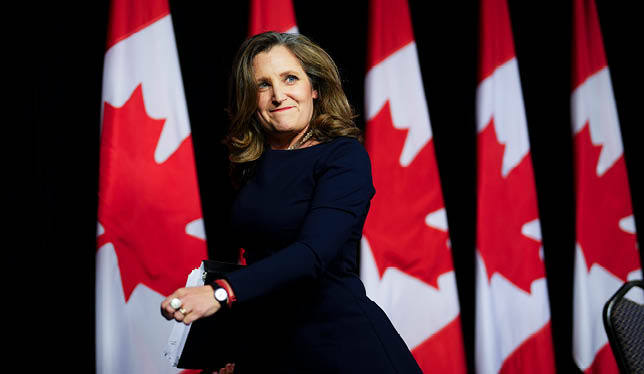2018 provincial budgets: highlights for universities
Increases in some provinces make up for lost ground, while others tread water.

Saskatchewan unveiled its provincial budget on April 10 – the last of the provinces to do so this year. New Brunswick was the first out of the gate with its budget on January 30, followed by British Columbia in February and the rest of the provinces in March and early April.
There was good news for universities in Quebec, with the provincial government announcing a nearly six percent increase in operating funds for 2018-19, following years of what many university administrators considered to be serious underfunding. Universities in British Columbia and Saskatchewan also will see increases in operating grants above inflation, while most other provinces saw minor increases or decreases.
The following chart summarizes changes to operating funds for universities from the previous fiscal year, based on numbers provided by Universities Canada. Keep scrolling to read budget highlights for the postsecondary sector in each province, for a more detailed understanding of grants to universities.
Hover over the graph to see the numbers in more detail.
[visualizer id=”46060″]
British Columbia
- Total transfers to universities, colleges and vocational institutions will reach just over $2 billion.
- The government has set aside $450 million in financing to help public postsecondary institutions construct at least 5,000 new beds of student housing, with the first $259 million to be made available over the next three years.
- $2.6 billion is carried forward from prior multi-year capital allocations to support postsecondary education capacity in key labour market areas (science, trades, technology).
Alberta
- Operating grants to the postsecondary sector at large will increase to $5.7 billion, of which $2.2 billion is directed to universities.
- An additional $17 million will support a tuition freeze for the fourth year in a row.
- New funding of $6 million will go toward investment in 3,000 new technology-related, postsecondary program seats, ramping up to $43 million annually by 2022-23.
- Budgeted funding for postsecondary infrastructure will drop 30.5 percent to $727.6 million in 2018-19.
Saskatchewan
- The University of Saskatchewan, University of Regina, and federated and affiliated colleges, will receive $470 million in operating grants for 2018-19. This represents an increase of $20 million, or 4.4 percent, over the previous year. However, $18 million of that new funding is targeted to the U of S College of Medicine, meaning effectively a freeze in funding elsewhere.
- The budget reduces needs-based student financial assistance by 19.4 percent while holding stable the amount for merit-based scholarships. The Saskatchewan Advantage Grant for Education Savings, suspended as of January 1, 2018, will see a reduction of 92.5 percent in 2018-19.
Manitoba
- Operating grants for universities total $676 million, along with capital funding of $9.8 million.
- The Manitoba Bursary Program will see $2.7 million in additional funding, an increase of 25 percent.
- Overall non-repayable student assistance will decline 0.4 percent over the previous year.
Ontario
- In 2018-19, infrastructure funding for universities is projected at $317 million, a 10.1 percent increase from the previous year.
- Net tuition billing is set to take effect in the 2018-19 academic year. This means students will receive one bill from their institution, which takes into account OSAP grant and loan funding and any financial assistance from their school.
- The budget promises a new investment of $500 million starting in 2020-21 to help renew and modernize Ontario’s university and college campuses.
- The budget also earmarks $132 million over three years to support experiential learning and increase STEM graduates in the province by 25 percent over the next five years (from 40,000 to 50,000).
Quebec
- The budget includes a gradual implementation of a new university funding formula that will see overall funding for universities increase by $497 million by 2021-22 (including $250 million in 2018-19). Roughly half of this new investment is for general operating grants.
- In 2018-2019, grants to the universities stand at $3.5 billion, a 6 percent increase in relation to the preceding year. Of this amount, $1.1 billion is destined for the Université du Québec network.
- Support for university infrastructure will increase by $80 million in 2018-19. Along with last year’s investments, this will ramp up to $250 million in additional support by 2021-22.
- Additional investments of $116 million are planned to enhance the success and integration of all students, including vulnerable groups and Indigenous peoples.
New Brunswick
- The budget gives $266.4 million in operating grants to universities. This includes an increase of $45 million over four years to address shortfalls arising from implementation of new tuition schedules through to 2020-21.
- The new tuition schedule includes a two percent cap on tuition increases; operating grants will be increased to meet the loss in revenue (one percent per year for the first four years, two percent in year five, for a cumulative increase of five percent).
Nova Scotia
- Grants to universities for programs and services will total $425.3 million, a 1.8 percent reduction over last year. This change reflects reductions in “special payments,” while operating grants will actually increase 1.2 percent to $354.9 million.
- The budget also includes $1.7 million to expand the Graduate to Opportunity program, including an upgraded subsidy for hiring diverse graduates and women in non-traditional careers, bringing the total program investment to $6.5 million.
Prince Edward Island
- Operating grants for the University of Prince Edward Island will reach $41.5 million (which includes $9 million for UPEI’s Atlantic Veterinary College).
- The province plans to sign a multi-year funding agreement with the university to allow the institution to better plan its future operations.
Newfoundland and Labrador
- Total operating grants for Memorial University decline by $5.13 million, owing to diminished support to offset the ongoing tuition freeze. The tuition freeze will continue for new students from Newfoundland and Labrador and for all current students until fall 2021, while new students from outside the province will see an increase starting in 2018.
- The budget allocates $60.4 million to Memorial in 2018-2019 to maintain the current tuition regime.
Featured Jobs
- Business – Lecturer or Assistant Professor, 2-year term (Strategic Management) McMaster University
- Veterinary Medicine - Faculty Position (Large Animal Internal Medicine) University of Saskatchewan
- Education - (2) Assistant or Associate Professors, Teaching Scholars (Educational Leadership)Western University
- Psychology - Assistant Professor (Speech-Language Pathology)University of Victoria
- Canada Excellence Research Chair in Computational Social Science, AI, and Democracy (Associate or Full Professor)McGill University















Post a comment
University Affairs moderates all comments according to the following guidelines. If approved, comments generally appear within one business day. We may republish particularly insightful remarks in our print edition or elsewhere.